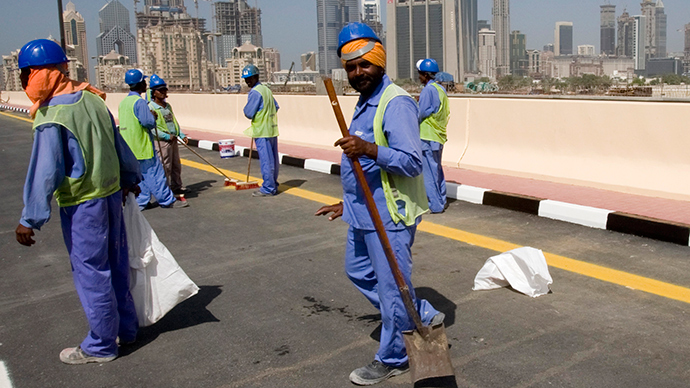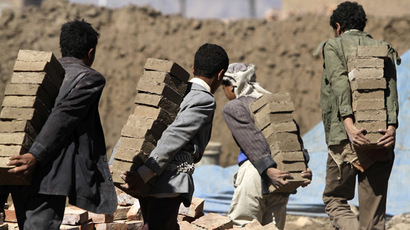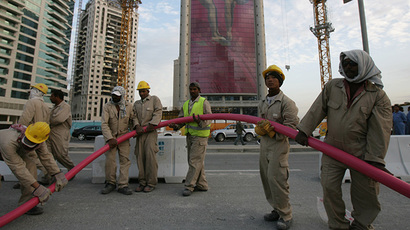Migrant workers in UAE abused, exploited under ‘kafala’ system – HRW

Domestic workers across the UAE have been subjected to horrendous physical, verbal and sexual abuse or passport confiscation in the abuse of the kafala, or sponsorship, system according to a new report by Humans Right Watch.
HRW estimates that some 146,000 domestic female workers have arrived to the UAE from countries such as the Philippines, Indonesia, India or Bangladesh. They come on promises of good working conditions, higher wages, and a chance to escape the poverty of their home countries.
However, the NGO heard complaints that workers are forced to
labor excessive hours, or are even being subjected to physical
violence or sexual abuse - while they cannot leave as employers
confiscate their passports.
The HRW covertly interviewed 99 people in the UAE, in the end
drawing up a 79-page report titled ‘I
already bought you’.
“I would wake up to start cooking, then cleaning, washing
clothes, and then cooking again. No rest, there was just no
rest... Because she kept yelling, I cried and asked to go back to
agency, but madam said ‘I already bought you…’” a
23-year-old Indonesian domestic worker in Dubai told the NGO.
READ MORE: ‘Modern slavery’: Intl delegation decries migrant rights abuses in Qatar
“My boss started hitting me after two weeks of being
there,” another worker revealed to HRW. “She hit me with
her fist to my chest. She scraped her fingernails to my neck, and
slapped my face. I was bruised on my neck. She sometimes pulled
out tufts of my hair.”
In total, “more than two dozen” domestic workers told
the human rights group that employers had either physically or
sexually abused them. One reported a broken arm as a result of
her employer violently twisting it and another said she was
raped.
“A large majority of the domestic workers Human Rights Watch
interviewed alleged their employers had verbally abused them by
shouting at them and calling them names such as ‘donkey’ or
‘animal’,” the report noted.
The problems arise through the UAE’s visa sponsorship system,
known as ‘kafala’ which creates a tie between migrant workers and
their visa sponsor and which also means that migrant workers
cannot switch employers.

“The UAE’s sponsorship system chains domestic workers to
their employers and then leaves them isolated and at risk of
abuse behind the closed doors of private homes,” said Rothna
Begum, Middle East women’s rights researcher at HRW.
“With no labor law protections for domestic workers,
employers can, and many do, overwork, underpay and abuse these
women.”
While the UAE has attempted to conduct some reforms to the
sponsorship system, they still have very few rights.
HRW noted that it had sent its research findings to appropriate
UAE government bodies. However, none had provided a response to
the NGO by the time of the report’s writing.
HRW has demanded that kafala be amended, stating that the entire
system should be overhauled so that the domestic workers can
switch employers without losing immigration status.
“It should pass the draft law on domestic workers, in line
with the ILO Domestic Workers convention, raise public awareness
about standards under the new domestic worker contract, and
expand shelter and other aid and remedies for abused domestic
workers,” HRW recommended.
The kafala system is also used in Lebanon, Saudi Arabia, Jordan
and other Gulf Arab states including Qatar, which is set to be
the first Arab host of the World Cup tournament in 2022.
READ MORE: Almost 30 million people worldwide
live as slaves – report
Qatar has approved new measures to improve conditions foreign
laborers, including giving them a siesta. The move follows
international criticism over 'World Cup slaves' and Qatar is
considering replacing their kafala system with a “system
based on employment contracts” according to announcements
made back in May.
Qatar has been facing increased international criticism over
foreign workers’ rights since last September, when a Guardian
investigation revealed that at least 44 Nepalese construction
workers died in Qatar Between June 4 and August 8 in 2013. The
newspaper exposed horrifying conditions, with the workers not
being given enough food and water.














